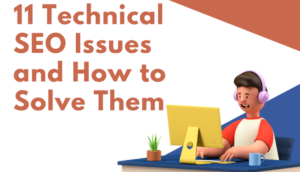Starting and maintaining a blog is not easy. To reap all the benefits of blogging, you need to put a lot of time, effort, and money into maintaining your blog.
Maintaining a blog requires constantly monitoring it to ensure you give your audience the best experience. For instance, if your bounce rate is high, you will need to figure out why and create a solution. Are people living faster because of your load speed? Or are they living because your user interface seems outdated? Blog maintenance will help answer those questions.
Most bloggers are unsuccessful because they fail to invest in maintaining their blogs. They lag behind competitors and miss out on opportunities to attract new users. This is because they might be breaking google webmaster guidelines unknowingly. After all, they didn’t notice a broken link that was harming their SEO.
In this article, we will explore steps you can take to maintain your blog to ensure you accomplish your blogging goals.
5 Ways to Maintain a Blog
Blogging is one of the best ways of organically attracting people to your website. It allows you to reach an audience interested in what you are offering. Businesses use it to attract potential customers, and writers blog to reach a community they can share their thoughts and knowledge with.
Whatever your goal is, you need to maintain your blog and keep it up-to-date to create opportunities, value, and build your brand. You will be able to stay relevant to your audience and search engines. With so much content to consume on the internet, you don’t want to bore your audience. Conversely, Google cares about how frequently you update your blog and want to notice an improvement.
Here are five things you should do when maintaining your blog to appease your audience and search engines.
Have a Blogging Strategy
When it comes to blogging, you can’t afford to wing it. You need to premeditate every step you take. A blog strategy will help you understand your audience better and produce the type of content they want. Most importantly, blogging can help you meet your Internet marketing goals.
To create a blog strategy, you have to:
- Define your goals
- Research your target audience
- Analyse competitors
- Perform keyword research
- Establish distribution channels
- Create a content calendar
- Devise a monetisation strategy
- Publish and distribute content
- Analyse your results
A blog strategy ensures that you maintain your blog by regularly updating it, staying ahead of competitors and improving your ROI. You can make better decisions that increase conversions, create a community and build your brand when you have a strategy and not depending on luck.
Update and Repurpose Old Content
As a blogger, it’s your job to constantly develop fresh ideas and produce new content to keep your readers happy and engaged. In your quest to do that, it’s easy to forget about the 100s (or maybe 1000s) of blog posts you have previously published. What you might not know is that those old posts are still relevant and can affect the health of your blog.
And that’s not all; here are five more reasons you should repurpose your content.
- To replace outdated information, including statistics and visuals
- To add new information/tips, remove old ones and update your links
- To update the format to reach a larger audience, e.g., you can convert a blog into a video script, infographics or an email
- To ensure you keep ranking as new information keeps your post helpful
- Share it with your newer followers who haven’t discovered it
Repurposing your content doesn’t include adding new information or making small edits. You can update your content by producing spin-off articles or republishing them on other websites like mediums to reach a newer audience.
When you come across content that has become irrelevant, you should consider deleting or de-indexing it to prevent Google crawlers from seeing it. Irrelevant content can also hurt your reputation and credibility.
Keep Up With Your Competitors
No matter how niche your blog is, thousands of other bloggers compete with you for the top positions on the SERPs. To stay ahead, you must understand who they are and what makes their blogs tick. Knowing your competitors requires that you perform a blog analysis to identify their strengths and weaknesses and then leverage them to your advantage.
Start by looking into your competitor’s content strategy to understand what interests your audience and what works for them and doesn’t. Additionally, look at their source of traffic. This will inform you on how to market your blogs and where your audience is.
To keep an eye on competitors, you will need to invest in tools such as Ahrefs and Backlinko. They’ll help you discover keywords they’re ranking for and ones you need to target, track their backlinks, and monitor their social shares and activity. The idea behind monitoring your competition when maintaining your blog is not to copy them. Instead, it should help you develop a strategy to stay ahead.
Actively Market Your Blog
Every blogger dedicates a lot of time to finding a niche, identifying their audience and generating content. But the work doesn’t end there; you have to take your content to your potential readers by promoting it. Marketing your blog is the only way people will find you, help you get the most out of your efforts and potentially monetise it.
And before you ask, yes, getting organic traffic through SEO also requires marketing. You have to network with other bloggers and establish relationships, invest in link-building, and guest blogging. These are some ways you maintain your blog by establishing yourself in your niche and showing your expertise. You’ll be able to improve your website domain authority and direct traffic to your site. In the long run, this will help you rank.
When promoting your blog, it’s important that you do it in a way that helps you reach your target audience without affecting your long-term strategy. Avoid black hat SEO tactics like buying backlinks and spamming forums or comment sections of other blogs with your links. Instead, consider investing in email and social media marketing or paid promotions.
Constantly Audit Your Blog
Blog audit involves collecting and analysing your website’s content and other metrics to identify ways to improve your user experience, increase traffic and meet other objectives. Auditing your blog will help you identify what’s working and what’s not. The results you get from auditing your blog will usually inform your strategy and marketing decisions.
To maintain your blog, understand your audience, and shed light on content relevancy and accuracy, you must regularly audit your blog. Bloggers are also encouraged to audit their blogs when:
Your Traffic is Down: Auditing will help you identify the cause of the traffic dip and what you need to do. For instance, did a competitor overtake you, or did Google algorithm update affect your ranking? You’ll be able to fix the problem when you know what caused it.
Your Struggling With Content Ideation: A blog audit will help you identify content gaps. You will be able to understand all the topics you’ve written about, and that information might spark new ideas. Additionally, you will identify outdated content that needs to be deleted and those that need to be repurposed.
You Want to Create Better Content: Auditing your blog involves looking at your metrics. Analysing readability, page views, bounce rate, keywords, etc., will help you predict what your audience wants. This data can come in handy when you want to monetise your blog, change your strategy, or produce better content.
Get the Most Out of Your Blog
Maintaining your blog can be a tedious, never-ending process. But it usually pays out in the end. You will be able to stay relevant, gain better insights into your audience and establish yourself as an authority in your niche.
Maintaining your blog will help you manage your omnichannel experiences and increase customer satisfaction. You will improve your SEO ranking, helping you build a larger audience and boost your conversion rates.
Finally, remember that content is still king. All your effort in maintaining your blog will go down the drain if you don’t produce high-quality content that appeals to your audience. Regularly update your blog with relevant new content addressing your reader’s pain points.





